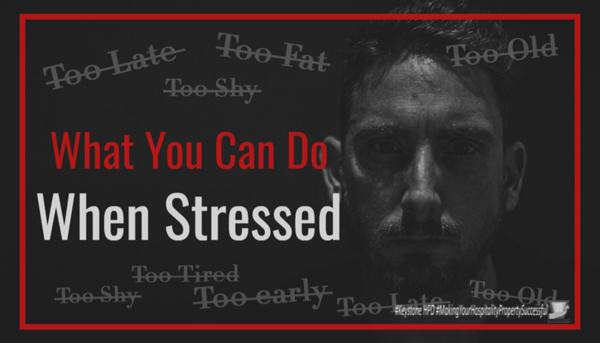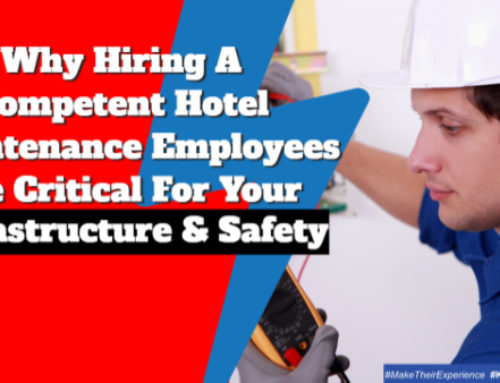.
.
Do you sometimes feel panicked? What to do when stressed?
You can’t keep your thoughts together. Being stressed can affect you deeply in both mind and emotion, so what can you do about it?
Stay with me and I’ll share some tips.
Welcome to another edition of Hospitality Property School.
I am your instructor, Gerry MacPherson.
.
Introduction
Let me start by asking you a couple of questions.
- Are you feeling stressed?
.
- Does it look like there are constant obstructions in your way?
.
- Does it seem like you have so much to do that you can’t keep them straight?
.
- Do you feel like some insane existence is sabotaging you by preventing your progress?
.
In this podcast, I am going to share some things to look for. Before I start I want to encourage anyone who is feeling extremely stressed to check with their doctor.
.
What is it like when you feel stressed? You can’t keep your thoughts together, every problem is huge, and you feel overwhelmed, anxious and have trouble sleeping. You might feel like you have the weight of the world on your shoulders.
.
Being stressed can affect you deeply in both mind and emotion.
.
There is a really good chance that you would be hard-pressed to find someone in your life — including you — that wouldn’t say they’re stressed about something.
And while stress can sometimes be good — it can help you conquer fears or motivate you to get something done — when you’re constantly in a state of tension and anxiety, it can have an effect on your body’s physical and emotional state.
.
.
I will look at 7 symptoms of stress and what you can do about them.
.
-
You’re constantly sick
It seems like every week you’ve felt sick. Are you continually have a cough, sore throat or a fever, you might want to blame your workload and not just your sneezing co-worker. When we are under extreme pressure, our bodies secrete a stress hormone called cortisol that can help us short-term, but if you’re stressed out constantly, these hormones aren’t as helpful and can become depleted over time. Cortisol and other hormones are components of the immune system and though they help the body cope with stress, when these hormones are withdrawn, we become more susceptible to sickness.
Stress can also slow wound healing, contribute to the reactivation of latent viruses, and increase vulnerability to viral infections.
.
What you should do: Allow your body the time it needs to recover. Listen to your body when you feel tired or drained and make time for rest and extra sleep.
.
.
-
You’re having trouble concentrating.
When you’re too overwhelmed to focus on what’s in front of you, or you can’t remember simple things like a co-worker’s name, it could be a sign you’re overworked. Studies have also shown that long-term stress stimulates the growth of the proteins that might cause Alzheimer’s disease.
.
What you should do: If you can’t focus or remember simple things during the workday, taking a few long inhales and exhales can help when faced with a high-pressure situation. “Deep, even breathing not only affects whether or not our thoughts control us or we control them, but it also affects the bodily sensations that are experienced when faced with a high-stress situation.
There are more symptoms of stress that you should be aware of and I’ll tell you what they are and what you can do about them, right after a word from our sponsors.
.
.
-
If you have a constant headache
If you experience throbbing or feel pressure anywhere on the head or temple area, there’s a good chance it’s a tension or stress headache your lifestyle might be to blame.
.
What you should do: When stress is the cause of your headache, the easiest thing to say is, ‘have less stress in your life,’ but that advice itself is stressful. Understanding your headache‘s coming from stress can be helpful therapy. People oftentimes feel worse worrying and trying to figure out what the cause could be, so knowing it’s not some serious health problem may make a person feel better. Keep in mind, if your head pain feels like a “migraine headache,” “the worst headache of your life,” or a headache that wakens you from sleep, those are signs of a dangerous health problem and you should visit a doctor immediately.
.
.
-
Your back or neck is always hurting
If you’ve got a stiff neck, your lower back cramped up after a long day of work, or knots in your shoulders, it could be due to your work or personal situation. High levels of stress and tension create discomfort and muscle pain by tightening muscles and causing muscle spasms which can also lead to headaches.
.
What you should do: Many relaxation techniques can help with stress reduction, including taking deep breaths from the diaphragm, meditation, massages and yoga. Devote time for stretching breaks throughout the day.
.
.
-
If you having trouble sleeping
If you’re wakening up and worrying or deliberating over things, it could be a sign of anxiety or depression. After a full day, sleep should come easy and getting into bed a time you can shut your brain off and relax. If you feel tired but have a difficult time falling asleep, it’s possible you have stress-related fatigue.
.
What you should do: If this is a regular occurrence, talk to your doctor and discuss whether your chronic stress may have led to depression. When you’re not sleeping well, everyday annoyances might make you feel even more overwhelmed and frustrated because you’re more vulnerable. Cutting back on caffeinated and alcoholic beverages and increasing exercise can also improve sleep patterns.
.
.
-
Your hair is starting to fall out.
If you’re waking up with more than a few strands on your pillow, you may be experiencing a medical condition called alopecia areata. This is an autoimmune skin disease brought on when the body’s immune system attacks the hair follicles, causing small round patches of hair loss on the scalp. It is not dangerous, but it’s likely to be connected with severe stress. This disease more likely to occur in young women or adolescent girls.
.
What you should do: This is usually a temporary condition and your hair will grow back once the stress is minimized. But don’t be afraid to talk to your doctor about what’s going on.
.
.
-
You’re getting urinary tract infections.
If you don’t take the time for bathroom breaks, you could be putting yourself at risk for urinary tract infections. When people are under increased stress or working too hard, they sometimes put off going to the bathroom, but that could have huge risk factors.
.
What you should do: This one is a no brainer – when you feel the urge to go to the bathroom, go to the bathroom. An uncomfortable urinary infection is going to feel way worse than those few minutes you spent trying to crank out your work.
.
Did these make sense? Let me know by leaving a comment.
.
The next step you should consider is to make a plan and set goals.
Most of us know it’s easy to make goals and to be able to see yourself meet them, but the problem is actually doing it during the daily grind.
So how do we overcome this problem?
Start by taking some time and making a mind map. You can do this on your own or as a group in a brainstorming session.
.
.
What is a Mind Map?
A mind map is a diagram that represents thoughts and concepts beginning with a central idea.
.
In order to start a mind map, you will need a whiteboard or Bristol board, something big to write on. In the centre of the board write your main theme or idea; for example, hotel, bed-and-breakfast or resort. Then link related ideas, words or drawings to it through branches. You can then add secondary branches and as many sub-branches as necessary to reflect any ideas around that central thought. Keep adding until you cannot think of anything else.
.
Mind maps are great!
.
It encourages you and others to perform radiant thinking or creative thought which is an effective method to improve your understanding and memory through the visual illustration of information.
Determine your priorities and deadlines; put them in a calendar.
If you have projects you want to accomplish, determine when you want them completed and work backwards to establish a realistic timeline writing all of the steps and elements you need to take to get there.
.
Now that you can see what has to be done it might not look quite as scary.
.
Whenever you can chunk or batch?
Chunking is the process of dividing something into smaller pieces. You can chunk down a job or a project to make actionable steps and batching and I will give you an example of batching.
If you are in the habit of sending out thank you cards to your guests for staying, instead of doing them one at a time, wait until you have a few you like to send and do them all together. This can be more efficient and save you time.
.
Another important thing to remember is when planning and setting goals think long-term and are patient.
.
As in the immortal words of Warren Buffett:
“No matter how great the talent or efforts, some things just take time. You can’t produce a baby in one month by getting nine women pregnant.”
.
Changing your habits
Don’t worry about change.
A renowned author once said, “Human beings are creatures of habit. It’s amazing what we can get used to”. Indeed, human beings today have acquired a habit of change – to constantly reinvent ourselves every day.
Habits of thoughts and action are the fundamental blueprint of human brain activity. With every habit we develop, our brains form neural connections that are repeated. Every time we do the same thing, these patterns are stimulated and strengthened.
.
Now to be clear, researchers highlight that changing an old habit requires replacing the routine but maintaining the same reward.
For example:
If you decide to replace your habit of using a laptop/phone before you go to sleep, identify the reward you get from this behaviour first.
Your reward might be entertained after a long day of work. To maintain this reward of entertainment I would replace the routine with another form of visual stimulus, like reading a book or a magazine or doing a crossword puzzle.
.
This is a better habit and by maintaining it regularly you can train your brain to be equally satisfied.
.
More about changing your goals into habits
Breakdown a bigger goal into smaller habits.
For example:
If you want a healthier daily routine it can be broken down into smaller, achievable habits. Drink warm water when you wake up, go to sleep at 9:30 pm and walk around the property for 30 minutes.
Focus on one habit and once it is unconscious and automatic, move on to accommodating another habit.
Don’t spoil your habit, consistency is key. Trying to change things up every two weeks will motivate your restless mind to focus on the reward rather than the process.
Mistakes are milestones. Don’t be hard on yourself for the minor setbacks in training your brain. Treat your mistakes like Google maps treats them, by rerouting yourself.
.
What is the next step?
Do it!
.
It’s never too late to get on track with your goals. When you break goals into doable chunks and batch whenever you can it is much easier and more motivating to achieve them.
.
.
In conclusion
Looking for symptoms of stress and taking the appropriate steps to correct the situation will not only improve your business but could save your life. It cannot be overlooked.
What is the next step, make a plan and set your goals:
It’s never too late to get on track with your goals. When you break goals into doable chunks and batch whenever you can, it’s much easier and you will feel more motivated when you achieve them.
.
What do you do to relieve stress? Let me know in the comments.
.
.
In the next episode, I will talk about employee turnover.
.
.
That’s it for today’s episode,
Until next time, have a fun day.
.
PS. Did you see the latest INNsider Tips episode? If not, make sure you sign up in the notes section so you don’t miss any.
.
.
⇒ TO READ OR LISTEN TO THIS EPISODE ON KEYSTONE HOSPITALITY PROPERTY DEVELOPMENT:
https://keystonehpd.com/What-You-Can-Do-When-Stressed-209
.
.
Get Your INNsider Tips
https://keystonehpd.com/Sign-up-for-INNsider-Tips
.
.
Join one of your private groups
https://keystonehpd.com/private-groups
.
.
Say hi on social:
Facebook: https://www.facebook.com/KeystoneHDC
.
Twitter: https://twitter.com/KeystoneHDC
.
Linkedin: https://www.linkedin.com/company/keystone-hospitality-development
.
.
Listen to The Hospitality Property School PODCAST here:
https://keystonehpd.com/itunes-podcast
.
https://www.spreaker.com/keystonehdc
.
.
YouTube
.
.
A Division of Keystone Hospitality Property Development
.






